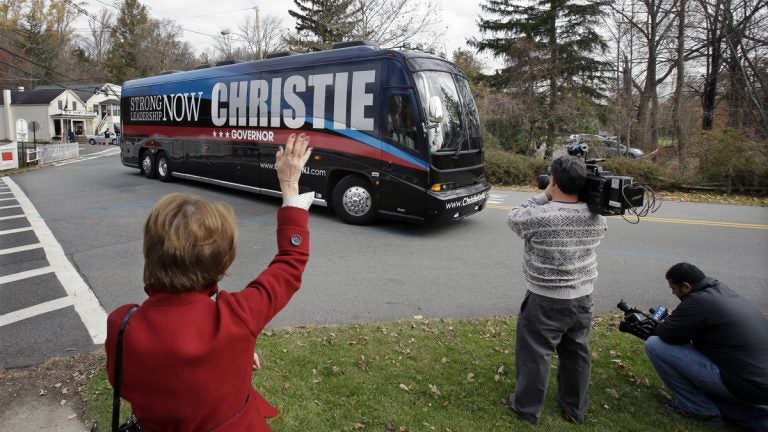Gov. Chris Christie’s landslide win sets stage for a presidential run

Governor Chris Christie's campaign bus leaving Mendham Township, N.J. after a campaign visit yesterday. (AP Photo/Mel Evans)
Ebullient over his 22-point reelection victory, Gov. Chris Christie ended one campaign and began another by equating the “spirit of Sandy” with the spirit of bipartisanship on an Asbury Park Convention Hall stage chosen to remind the nation of the performance under pressure that propelled him to the forefront of the race for the presidency in 2016.
“I know that tonight, a dispirited America, angry with their dysfunctional government in Washington, looks to New Jersey to say, ‘Is what I think is happening really happening?'” Christie asked, pausing as the crowd cheered. “Are people really coming together? … African-Americans and Hispanics, suburbanites and city dwellers, farmers and teachers? Are we really all working together?’
“Let me give the answer to everyone who is watching tonight, under this government our first job is to get the job done and as long as I’m governor, that job will always be finished!” Christie vowed in a speech delivered just two hours after piling up 60.5 percent of the vote in defeating Sen. Barbara Buono (D-Middlesex) in a blue state that has not voted for a GOP presidential candidate in 25 years.
It was a “sound bite crafted for a national audience, that Washington needs to do what we do in New Jersey, and it sets Christie up as a national candidate,” said Ben Dworkin, director of Rider University’s Rebovich Institute of New Jersey Politics.
“If he chooses to run for president, the nation will like what it sees,” Sen. Joseph Kyrillos (R-Monmouth), who cochaired Christie’s 2009 campaign, said approvingly. Christie will get to hone his message for a national audience as chairman of the Republican Governors Association next year.
How N.J. voted
Christie polled 1,242,568 votes to Buono’s 781,710 and carried 19 out of 21 counties, including Buono’s home county of Middlesex. He lost only the Democratic bastions of Essex and Hudson, where ironically he received his highest-profile Democratic endorsements from Essex County Executive Joseph DiVincenzo and Sen. Brian Stack (D-Hudson).
His 60.5 percent to 38 percent win fell well short of former Republican Gov. Thomas H. Kean’s 69 percent to 31 percent landslide in 1985 that flipped control of the state Assembly from Democratic to Republican. But Kean put his personal popularity on the line to campaign aggressively against an “obstructionist” Democratic Assembly.
Christie, however, often appeared side-by-side with Senate President Stephen Sweeney (D-Gloucester) and other Democrats he worked with to pass overhauls of government spending caps, pensions, health benefits, and teacher tenure. While he put money into several Republican races in Bergen, Mercer and Middlesex counties, he drew the line at Route 195 and did not challenge Sweeney and South Jersey power broker George Norcross on their home turf.
Buono didn’t name names, but she used her concession speech to attack the “onslaught of betrayal” by elected and unelected party leaders who publicly and covertly helped Christie, insisting that “they didn’t do it for the state. They did it to help themselves politically and financially.”
But with Christie riding high in the polls and outspending Buono by $13.2 million to $3 million in the general election, even Buono allies ran ads touting their eagerness to work with Christie in a bipartisan way. The ads evidently worked.
“Chris Christie won all across the state, but Democratic legislators won all across the state too,” Dworkin noted. “Clearly, this was a personal victory for Christie, not for the Republican Party.”
As a personal victory, Christie’s reelection is more impressive than Gov. Kean’s 1985 victory over Democrat Peter Shapiro, said Bob Grady, a senior adviser in the Christie campaign who was also one of the chief architects of Kean’s landslide in which he carried all but three of New Jersey’s then-566 municipalities.
“Politics in this country is much more partisan today than it was 28 years ago, which makes Chris Christie’s ability to capture Democratic and independent votes that much more significant,” said Grady. “This shows what you can do if you focus on the big things like the economy, creating jobs, pension reform, cutting taxes, and better schools. African-American and Hispanic voters care about those issues, not the side issues Buono campaigned on.”
Grady said Christie and Kean are “more similar than people think.” Like Kean, Christie started campaigning for minority votes from his first days in office, going to Newark to visit North Ward Democratic leader Steve Adubato at his model charter school.
According to exit polls, Christie ended up winning 21 percent of the African-American vote, 51 percent of Hispanics, two-thirds of independent voters, one-third of Democrats, 46 percent of union voters, and 56 percent of women, even though Democrats ran an all-woman ticket for governor and lieutenant governor.
Christie recalled during his speech that when “we came into office four years ago, we said people were tired of politics as usual and promised to go to Trenton and turn it upside down … We showed that it is possible to put working together first, to stand for principle, and still get things done.”
“If we can do this in Trenton, New Jersey, maybe the folks in Washington, D.C., will see what’s possible,” he said. “In New Jersey, we still fight, we still yell, but when we fight, we fight for things that really matter in people’s eyes.”
What matters to New Jerseyans – and what matters to him, Christie said – is “to make sure everyone in New Jersey affected by Sandy is returned to normalcy in life. I will not let anyone, anything, any governmental entity, any political force get between me and completion of my mission.” Just as the mission “of a soldier is no one is ever left behind on the battlefield,” he said, “on the battlefield Sandy turned this state into, New Jerseyans will never leave anyone behind.”
Buono blames fellow Dems
As triumphant as Christie’s reelection celebration was, in front of hundreds of cheering supporters at the Jersey Shore, Buono’s subdued gathering in a small restaurant-bar in her hometown of Metuchen was bittersweet.
Based on exit polls, CNN called the race for Christie at 8:00 p.m., just as the polls closed, and Buono waited only 45 minutes before making her concession speech. She pulled few punches, criticizing the Democratic bosses and saying she was served up as a long-shot candidate against a popular governor, only to be spurned by the very party she served. “I took one for the team, only to realize too late that there was no team,” she said,
Buono’s abandonment by the party was a recurring theme among her supporters last night, and a few who watched from the sidelines, too. “The Democrats could have come together,” said U.S. Rep. Rush Holt (D-N.J.), one of the few notable Democratic names to attend Buono’s event. “That would have been nice for a change.” As for the Democratic party going forward, Holt said: “There is some rebuilding to do. Some of the prodigal Democrats have to come back in line.”
U.S. Rep. Frank Pallone (D-N.J.), one of Buono’s earliest and staunchest supporters, was less critical of his own party, saying the odds were long from the start given Christie’s popularity post-Sandy. “A lot of people were looking at the aftermath of Sandy, and not their future in the next four years,” he said. “I think the Democratic Party remains strong and worked hard to get her elected. Some obviously didn’t, but I think the party comes out of this still strong.”
Buono’s union backers, including those from the New Jersey Education Association, the teachers union that pumped more than $11 million into the state races, including Buono’s, were out in force, but resigned to the results. “We were behind a good candidate, but the election is over, and now we go to work,” said Wendell Steinhauer, the NJEA’s president. “The governor and NJEA can work together on some common goals, and we can do some good.”
One Democrat who may have come out ahead in the election was Milly Silva, the union leader who was Buono’s running mate as candidate for lieutenant governor. And after Buono’s concession, she hardly backed away from the launching pad she was offered, sticking around to do press interviews and saying that she “absolutely” planned to again run for office in New Jersey.
Silva, too, stuck to the message that the ticket’s loss was at least in part due to the party’s own dysfunction. “I hope when everyone wakes up tomorrow, I hope they will evaluate who we are as a party,” she said. “It was infuriating to see the party did not stand up for Barbara and I.”
Superstorm Sandy created a bipartisan window
Christie’s landslide victory has been projected by pollsters since Buono entered the race in December, but his reelection was not always seen as so inevitable. Just over a year ago, before superstorm Sandy smashed into New Jersey, killing dozens, leaving 360,000 homeless and millions without power, Christie looked formidable, but beatable by the right Democratic candidate.
Before Sandy, more people viewed Christie as a bully than a forceful leader. He was the most conservative governor in modern New Jersey history in an increasingly blue state, and his opposition to abortion, gay marriage, and stricter gun control laws ran counter to the socially moderate views of New Jersey’s independent swing voters. And while voters supported his efforts to make public employees pay more for their pensions and health benefits, they preferred a Democratic property tax cut plan over Christie’s income tax cut.
Sandy gave Christie the opportunity to pivot fully to a message of bipartisanship, starting with his embrace of President Barack Obama on the Atlantic City Boardwalk the week before the 2012 presidential election. The more national conservatives blamed Christie for Obama’s reelection, the more Christie’s popularity grew with New Jersey’s independent and Democratic voters. Christie’s attack on Speaker John Boehner and his GOP House majority for holding up Sandy aid further cemented his image as a governor who put his state ahead of partisanship.
With Christie’s popularity soaring and Buono already in the race, Newark Mayor Cory Booker, the only Democrat with the national image and fundraising ability to match Christie’s, decided to pass up a tough fight against Christie to run as an odds-on favorite for the U.S. Senate in 2014 instead. One after another, Senate President Stephen Sweeney (D-Gloucester) and the state’s Democratic congressmen took themselves out of the running, and finally, South Jersey power broker George Norcross gave Buono a backhanded endorsement in early February that essentially guaranteed her the nomination.
Most candidates move toward the center after winning their primary or cementing the nomination, but Buono never stopped running as the candidate of the “Democratic wing of the Democratic Party.” She tied herself inextricably to the public employee unions that Christie had demonized, and doubled down on her pro-labor strategy by selecting Silva, a Hispanic organizer from the Service Employees International Union, as her lieutenant governor on all woman-ticket.
Buono championed a minimum wage hike for the working poor and a millionaire’s tax to fund property tax relief for the embattled middle class. She attacked Christie on gun control, abortion, gay marriage, climate change, and his cancellation of a new passenger rail tunnel to New York. She charged that he was really running for president, not to serve a full four-year term as governor.
But she never raised the money she needed to compete with Christie, who quickly raised the maximum for public matching funds and was able to run 16 television ads to Buono’s two.
DiVincenzo and Stack led a parade of 50 Democratic elected officials in endorsing Christie. Norcross put his efforts into raising money for the national Fund for Jobs, Growth and Security to put into protecting Democratic legislative seats. And even Buono supporters ran TV and video ads proclaiming their eagerness to work in a bipartisan way with the popular Republican governor.
________________________________________
NJ Spotlight, an independent online news service on issues critical to New Jersey, makes its in-depth reporting available to NewsWorks.
WHYY is your source for fact-based, in-depth journalism and information. As a nonprofit organization, we rely on financial support from readers like you. Please give today.




